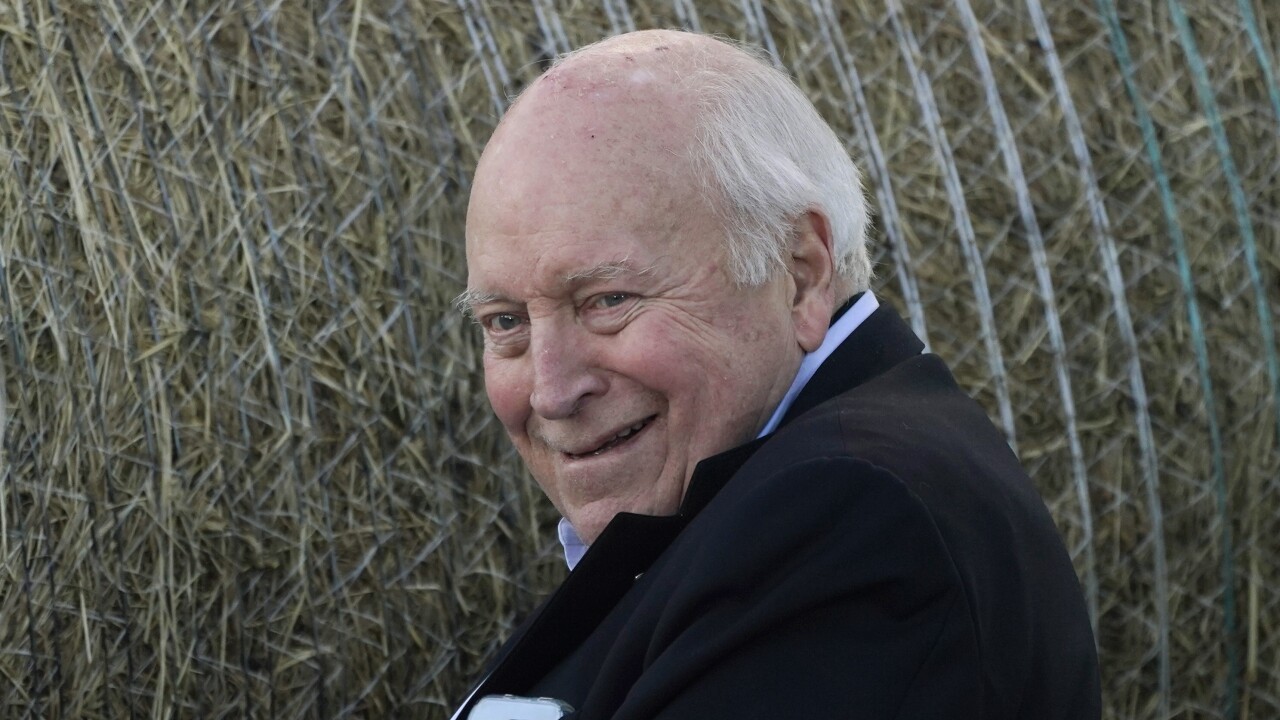Former Vice President Dick Cheney, who served in the White House under President George W. Bush from 2001 to 2009, has died at age 84, according to the Associated Press, citing a family statement.
Cheney died from complications of pneumonia and cardiovascular disease, the statement said. His family — including wife Lynne and daughters Liz and Mary — were by his side late Monday.
“For decades, Dick Cheney served our nation, including as White House chief of staff, Wyoming’s congressman, secretary of defense and vice president of the United States,” the statement said. “Dick Cheney was a great and good man who taught his children and grandchildren to love our country, and to live lives of courage, honor, love, kindness and fly fishing. We are grateful beyond measure for all Dick Cheney did for our country, and we are blessed beyond measure to have loved and been loved by this noble giant of a man.”
As Bush’s vice president, Cheney took on a central role in administration policy and was a key voice on national security after the attacks on the United States on Sept. 11, 2001.
His White House career dated back to the Nixon administration. He served as President Gerald Ford’s chief of staff from 1975 to 1977. After Ford lost the 1976 election, Cheney entered elected office, serving as Wyoming’s lone member of the U.S. House from 1979 to 1989.
He left Congress to become secretary of defense under President George H.W. Bush from 1989 to 1993, overseeing Operation Desert Storm.
A major figure in Republican politics for decades, Cheney announced last year that he would endorse Democratic presidential candidate Vice President Kamala Harris.
How Cheney redefined the vice presidency
The vice president officially has few administrative duties beyond being the tiebreaking vote in the Senate. But for Cheney, he played a key role in advocating and promoting the Bush administration's agenda, especially when it came to national security. This was especially true when it came to national security policy as the U.S. went to war in Afghanistan and Iraq.
The Miller Center at the University of Virginia said that Cheney was likely "the most powerful vice president in U.S. history."
"His tremendous power stemmed from a number of variables, the most important being his relationship with the President," the Miller Center said. "President Bush had a great deal of trust in Cheney and often delegated significant details of policy-making to him. Cheney's understanding of the channels of power in government not only allowed him to make the most of these delegated responsibilities, but also create influence in areas where he had no specific authority. Although his power was often exercised out of the public eye, Cheney was able to push the malleable parameters of his authority and leave his fingerprints on many of the Bush administration's defining initiatives."
Cheney was also a rare vice president who never sought the presidency. Other than current Vice President JD Vance, every vice president since Spiro Agnew has sought the presidency after leaving office, except for Cheney. Cheney had said he considered running in 1996, but said he decided not to after talking to his family.
"I've never regretted that or looked back. I think that was the right decision," Cheney said in his final interview as vice president with Jim Lehrer in 2009. "And I also think my effectiveness with the President has been directly related to the fact that I've not been a candidate. When I get involved with issues in the White House or on Capitol Hill, they're because I'm representing the President, we're working on his agenda. I don't have my own separate agenda. I'm not looking over my shoulder to see how popular I am in the polls or how I'm going to do in the Iowa caucuses. I'm focused specifically on his agenda. And I think that's been one of the reasons we've worked so well together."
Cheney remembered by President Bush
President George W. Bush, Cheney's running mate in 2000 and 2004, released a statement remembering his vice president.
"The death of Richard B. Cheney is a loss to the nation and a sorrow to his friends. Laura and I will remember Dick Cheney for the decent, honorable man that he was. History will remember him as among the finest public servants of his generation – a patriot who brought integrity, high intelligence, and seriousness of purpose to every position he held.
"As a young White House aide and chief of staff, a Congressman, a Secretary of Defense, and my Vice President, Dick earned the confidence and high opinion of five presidents. I asked him to join my ticket in 2000 after first enlisting him to help me find the best running mate. In our long discussions about the qualities a vice president should have – deep experience, mature judgment, character, loyalty – I realized that Dick Cheney was the one I needed. I’m still grateful that he was at my side for the eight years that followed.
"Dick was a calm and steady presence in the White House amid great national challenges. I counted on him for his honest, forthright counsel, and he never failed to give his best. He held to his convictions and prioritized the freedom and security of the American people. For those two terms in office, and throughout his remarkable career, Dick Cheney’s service always reflected credit on the country he loved.
"Dick’s love for America was second only to his family. Laura and I have shared our deepest sympathies with Vice President Cheney’s wife Lynne and their daughters and grandchildren of whom he was so deeply proud. We are praying for Lynne, Liz, Mary, and the Cheney family as they honor a great man."





